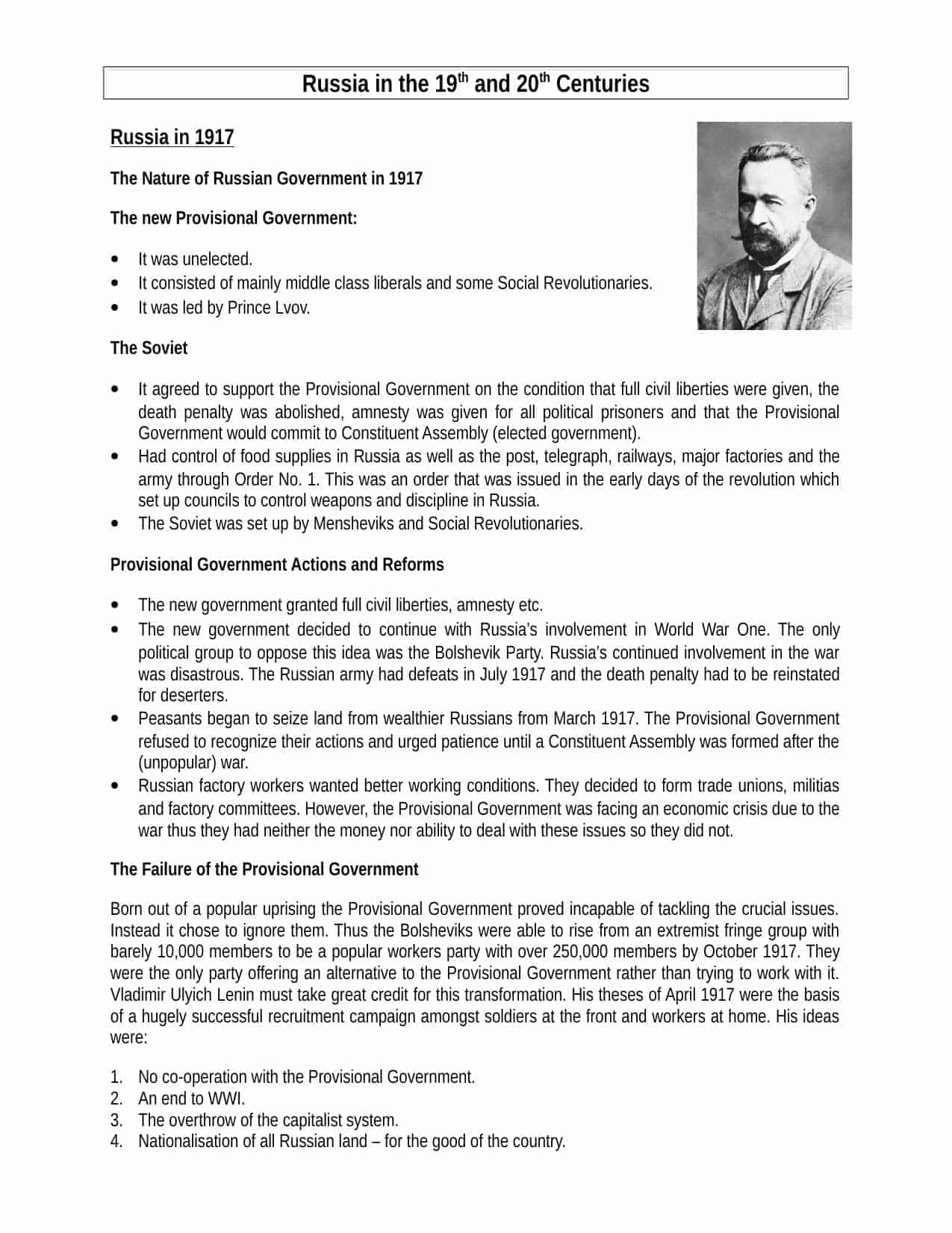Download Russia in 1917 Homework Task
Click the button below to download this worksheet for use in the classroom or at home.
Download →
Lesson Snapshot:
The new Provisional Government:
• It was unelected.
• It consisted of mainly middle class liberals and some Social Revolutionaries.
• It was led by Prince Lvov.
The Soviet
• It agreed to support the Provisional Government on the condition that full civil liberties were given, the death penalty was abolished, amnesty was given for all political prisoners and that the Provisional Government would commit to Constituent Assembly (elected government).
• Had control of food supplies in Russia as well as the post, telegraph, railways, major factories and the army through Order No. 1. This was an order that was issued in the early days of the revolution which set up councils to control weapons and discipline in Russia.
• The Soviet was set up by Mensheviks and Social Revolutionaries.
Provisional Government Actions and Reforms
• The new government granted full civil liberties, amnesty etc.
• The new government decided to continue with Russia’s involvement in World War One. The only political group to oppose this idea was the Bolshevik Party. Russia’s continued involvement in the war was disastrous. The Russian army had defeats in July 1917 and the death penalty had to be reinstated for deserters.
• Peasants began to seize land from wealthier Russians from March 1917. The Provisional Government refused to recognize their actions and urged patience until a Constituent Assembly was formed after the (unpopular) war.
• Russian factory workers wanted better working conditions. They decided to form trade unions, militias and factory committees. However, the Provisional Government was facing an economic crisis due to the war thus they had neither the money nor ability to deal with these issues so they did not.
The Failure of the Provisional Government
Born out of a popular uprising the Provisional Government proved incapable of tackling the crucial issues. Instead it chose to ignore them. Thus the Bolsheviks were able to rise from an extremist fringe group with barely 10,000 members to be a popular workers party with over 250,000 members by October 1917. They were the only party offering an alternative to the Provisional Government rather than trying to work with it. Vladimir Ulyich Lenin must take great credit for this transformation. His theses of April 1917 were the basis of a hugely successful recruitment campaign amongst soldiers at the front and workers at home. His ideas were:
1. No co-operation with the Provisional Government.
2. An end to WWI.
3. The overthrow of the capitalist system.
4. Nationalisation of all Russian land – for the good of the country.
5. All power to the Soviets.
These ideas were often condensed for propaganda purposes to ‘peace, land and bread’. However, he could not have done it without the naivety and incompetence of the Provisional Government. The Provisional Government faced two uprisings before the successful Bolshevik coup of October 1917.
• In July 1917 soldiers and workers marched on the Provisional Government headquarters demanding that the Soviet take control of the government. The troops stayed loyal to the Provisional Government and stopped the demonstrations. Many Bolsheviks were arrested and Lenin fled.
• In August 1917 General Kornilov threatened a counter revolution. The Provisional Government were so unpopular that they were powerless and had to release the Bolshevik’s Red Army from prisons in order to prevent Kornilov from entering Petrograd with his troops. The Provisional Government was humiliated. By September the Bolsheviks had a majority on the Moscow and Petrograd Soviets. Leon Trotsky became the chair of the Petrograd Soviets.
• In October 1917 a small band of tightly knit revolutionaries inspired by Lenin and led by Trotsky succeeded in removing the Provisional Government in an almost bloodless revolution. They had no experience of government and the civil servants went on strike. They faced food shortages and had no money in the state bank. Soldiers, sailors and workers were restless and there was widespread looting in the countryside. The Bolsheviks were a minority party who controlled only a small part of Russian territory. Lenin had promised peace, land and bread and in the face of Russia’s difficulties now had to find a way to fulfill these promises.
Worksheet Homework Task:
- Aimed at Students studying across UK Year 7,8 & 9 or equivalent
- Premium resource
- Use as you wish in the classroom or home environment
- Homework task on Russia in 1917.
- Contains questions throughout the study worksheet.
